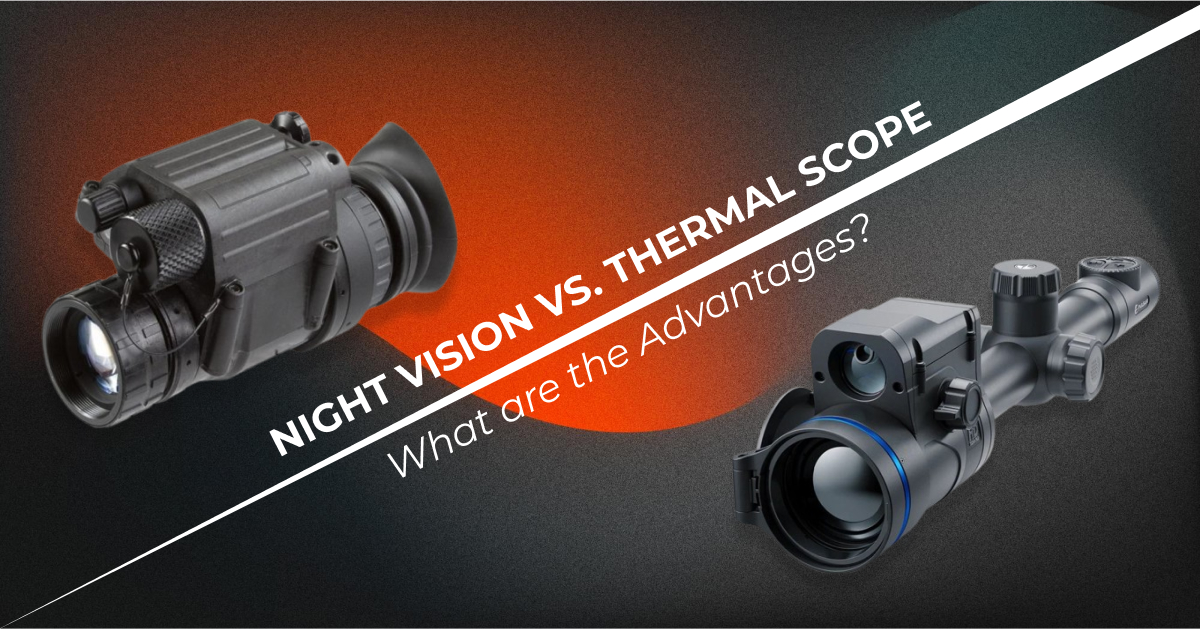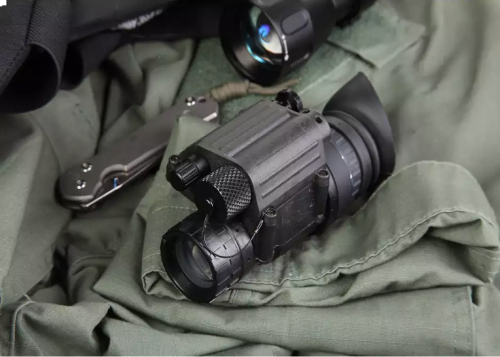Night Vision vs. Thermal Scope: What are the Advantages?

Are you ready to invest in a good scope? You have a decision to make.
Which is better: night vision scopes vs. thermal scopes? Hunters, law enforcement professionals, and outdoor enthusiasts might each give a different answer.
Deciding between the two impacts visibility in low-light and no-light situations. As a result, choosing between the two types of scopes is paramount to success in the field.
Understanding Night Vision Scopes
What’s the deal with night vision scopes? Who are they best suited for?
How Night Vision Scopes Work
What’s a night vision scope, and how does it work?
Night vision scopes amplify available light like moonlight and starlight. They do this through an intensifier tube.
Infrared illuminators can be used when there isn’t a light source to boost vision. The scopes create a green-tinted image. It’s clearer than what the naked eye can see in dark conditions.
Advantages of Night Vision Scopes
Night vision scopes provide more detailed images than thermal scopes. That lets you clearly see distinguishing features like branches, leaves, and even facial features.
Night vision scopes are generally more expensive than thermal scopes. As the years have gone by thermal scopes because of the evolving technology have decreased in price while night vision scopes have steadily increased because they are not as easy to obtain/manufacturer.
Limitations of Night Vision Scopes
As with most anything, night vision scopes are not without their limitations. They require at least a minimal amount of ambient light – like from the moon or starlight. When used in total darkness, night vision scopes are equipped IR illuminator which functions as a “flashlight” for night vision systems.
Likewise, night vision scopes are sensitive to bright light. Exposure to sudden bright lights – headlights, for example – can disrupt or even damage the intensifier tube. That would render the scope temporarily or permanently ineffective.
Night vision scopes also struggle in fog, smoke, and heavy vegetation. In those cases, the scope is less effective when hunting or conducting other operations in challenging weather or dense environments, and that’s where thermal technology comes in.
Understanding Thermal Scopes
How about thermal scopes? Is the technology superior?
How Thermal Scopes Work
How do thermal scopes work?
Thermal scopes detect infrared radiation emitted by objects. This identification lets them display heat signatures in shades of black, white, or colors.
The more heat varies between objects and the environment, the clearer the image. For example, animals and humans appear as bright objects against cooler backgrounds.
Advantages of Thermal Scopes
What are the advantages of thermal scopes? Unlike night vision, thermal scopes don’t rely on light. They can perfectly function even in complete darkness. That quality makes them especially useful for nocturnal hunters and tactical missions.
Thermal technology also detects heat signatures through fog, smoke, dust, and even light brush. That makes it easier to track animals and targets.
Thermal scopes can detect heat signatures from greater distances than night vision scopes, as well. That makes them ideal for long-range tracking and surveillance.
Limitations of Thermal Scopes
Thermal scopes can easily detect heat signatures. On the other hand, they don’t show clear images of facial features, clothing details, and background objects like night vision would. However, if you are in a familiar environment, you can identify an animal by its size and/or the way it moves.
Thermal or Night Vision Scope for Coyote Hunting?
Hunters often seek specialized tools that support hunting in different environments. Is a night vision scope or a thermal scope better for hunting coyotes?
Night Vision Scope for Coyote Hunting
Which type of scope is better for hunting? What about specifically coyote hunting?
Night vision scopes allow for clear identification of coyotes and other game. They’ll also be able to see the surrounding features in open areas that have some ambient light. Night vision scopes also help hunters navigate by clearly showing trees, bushes, and obstacles.
Thermal Scope for Coyote Hunting
Do thermal scopes work for coyote hunting?
Thermal scopes are ideal for detecting coyotes from long distances. This especially rings true when the game is hidden in tall grass or brush.
Because thermal scopes are unaffected by lighting conditions, they can be reliably used in total darkness and foggy weather.
Which is Better for Coyote Hunting: Thermal or Night Vision?
So, which is better for hunting coyotes? A thermal scope or a night vision scope?
Night vision is best for hunters in open fields that have some light. Thermal scopes do better in dense environments. They are also superior when hunting at long ranges.
Hunters might choose thermal scopes when conditions require tracking through brush or other obstacles. Thermal scopes are also better at detecting animals at a distance. Night vision scopes, on the other hand, are sufficient for those hunting in clearer, open areas.
Cost Comparison: Night Vision Scope vs. Thermal Scope
Which is more affordable: night vision scopes or thermal scopes? Is a larger investment worthwhile?
Night vision scope prices generally range from about $1200 to $7,000 or more. The exact cost depends on the scope’s generation. It also varies based on features like built-in IR illuminators or higher resolution. The scope price differs based on whether it’s designed for recreational purposes or professional use.
Thermal scopes cost more, typically ranging from about $699 to as much as $8,000 or more. The price depends on the scope’s resolution and range.
High-end models might offer greater detection distances or clearer heat signatures. These features, however, come at a steep cost. As a result, they are more suitable for professional use and dedicated hunters.
Other Considerations When Choosing Between Night Vision and Thermal Scopes
Still unsure whether a night vision scope or a thermal scope is better for you? There are a few other elements to consider.
Application and Use Case
How will the scope be used? Thermal scopes are often preferred by hunters, military and law enforcement. They use the scopes for surveillance since the tools offer more comprehensive detection. Night vision, however, is still commonly used for urban operations when visual identification is key.
Night vision scopes often are sufficient for recreational hunters. They allow them to track game in open fields and areas with some ambient light. However, thermal is often a better choice for hunters in difficult terrain and dense vegetation.
Battery Life and Durability
Night vision scopes typically boast a longer battery life than thermal scopes. That’s because they consume less power. Most night vision scopes can last anywhere from just a few to 36 hours or more on a single set of batteries.
Thermal scopes, on the other hand, have a shorter battery life. They average as little as 6 to 15 hours per charge thanks to their higher energy consumption. If you plan on using a thermal scope for an extended period, be sure to carry extra power packs and/or additional battery.
Weight and Size
Night vision: More compact and lightweight, making it easier to mount and carry for long periods. Best for users who need to remain mobile or carry multiple tools.
Thermal: Bulkier due to the added technology and larger lens, which can affect balance on rifles and make transportation more cumbersome.
Combining Night Vision and Thermal Technology
Can you combine night version with thermal technology? Some manufacturers do actually offer hybrid scopes that combine the two capabilities. Dual systems let users switch between modes. They provide flexibility for different environments. For example, thermal can be used for initial detection, then night vision offers better close-up identification.
These hybrid scopes combine the strengths of both night vision and thermal technologies. The mix allows for versatile use in the field. Hybrid systems also tend to be bulkier and more expensive. The added complexity might not be necessary for all users.
Thermal Scope vs. Night Vision Scope: Which is Better?
Night vision scopes and thermal scopes each offer clear advantages. It all depends on the users’ needs. The choice comes down to specific requirements, including the hunting environment and budget.
For expert advice or to find the best scope, visit Night Vision Guys to explore their wide selection of night vision and thermal optics.



















